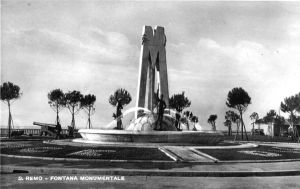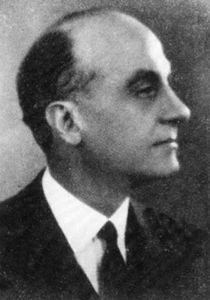Mayor, Lawyer and Politician
Giovanni Guidi was born in Sanremo in March 1903.
After graduating from the Gian Domenico Cassini High School, Guidi graduated from the Faculty of Law of the University of Genoa in 1925.
When he was only thirty years old, on 7 October 1933 he was appointed Podesta of Sanremo and was handed over by the Prefectural Commissioner Michele De Masellis.
Under his administration Sanremo underwent a profound urban change. In particular, the construction of the equestrian field and the Pigeon Shooting Stand, previously put into construction by the Podesta Pietro Agosti, was completed.
The enlargement of Corso Imperatrice was also carried out, an operation that involved the purchase and demolition of the Scottish church of Sant'Andrea, the Alexandra tea room and the Casinetta delle Rose; again as part of the enlargement of Corso Imperatrice, the most complex operation was certainly the demolition of the south façade of the Riviera Palace Hotel, with the consequent retreat.
of the building and the reconstruction without alteration of the Liberty style architectural lines. On the sea front, in order to allow a better visual cone, the expropriation of the Pian di Nave area and the consequent demolition of the buildings that stood there were carried out; there, on 4th November, on the occasion of the visit of the new Undersecretary of Agriculture Giuseppe Tassinari, a luminous fountain was inaugurated, the work of sculptor Giovanni Prini, depicting an enormous Mussolini "M".
On the sea front, in order to allow a better visual cone, the expropriation of the Pian di Nave area and the consequent demolition of the buildings that stood there were carried out; there, on 4th November, on the occasion of the visit of the new Undersecretary of Agriculture Giuseppe Tassinari, a luminous fountain was inaugurated, the work of sculptor Giovanni Prini, depicting an enormous Mussolini "M".
On the sides of the fountain were placed the cannons used in 1753 by the Republic of Genoa to bombard the city, which at the time was rebellious.
The old trams of the city were also eliminated in favour of more modern trolleybuses, allowing, with the simultaneous elimination of the tracks, the rebuilding of the road surface, so that Via Vittorio was equipped with a new brick structure to replace the old stones, which also happened with the pavements, which were rebuilt in quartzite.
On the initiative of Podesta Guidi, in December 1933, the Municipal Symphony Orchestra was founded in the Teatro Principe Amedeo (bombed during the war, it was no longer rebuilt); a concert by the Orchestra was also performed at the E.I.A.R. in Rome and broadcast throughout Italy.
In 1934 the schools in Via Volta were inaugurated. On 28th October 1936 the Sanremo-Monte Bignone cable car was inaugurated at the presence of the Undersecretary of Communications Giovanni Host-Venturi. In the autumn of 1939 the Municipal Hospital was inaugurated by the podestà.
In the Italian political elections of 25 March 1934, Podestà Guidi, together with the PNF federalist Ernesto Parodi, was elected Member of Parliament for the "Corporazione delle costruzioni edilizioni"; (Mussolini Government). On the occasion of the electoral victory the new Casa del Fascio in Via Manzoni was inaugurated.
As a member of parliament, he vigorously pursued initiatives aimed at improving connections and transport in the province of Imperia, fighting for the electrification of the Savona-Ventimiglia railway line and the extension of the Via Aurelia so that tourism would benefit above all.
In December 1939, after six years in office, Giovanni Guidi resigned from his podestarile position, to enlist voluntarily in the troops leaving for the Albanian front. In his place was appointed for a short time the prefectural commissioner Camillo Bruni and finally, in January 1940, the new podestà Silvio Silvestri, a retired quaestor who had already held public security positions in Sanremo.
In 1960, at the municipal elections in Sanremo, he presented himself as an independent member of the Italian Liberal Party, being elected councillor with wide consensus. Giovanni Guidi, who was now affectionately nicknamed "Il Podestà" by the citizens, was president of the cultural association "Famija Sanremasca" from 1962 to 1972.
He died in Sanremo on 22 July 1976.
(sources: Marco Mauro; Wikipedia)





